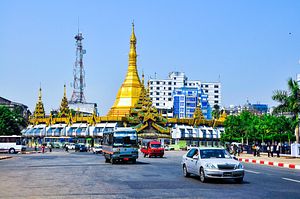Myanmar on Wednesday announced its first round of licenses to foreign banks, with Japan’s three biggest banks, Bank of Tokyo-Mitsubishi UFJ (BTMU), Sumitomo Mitsui Banking Corp and Mizuho Bank winning three of the nine licenses on offer. This was more than any other country, with Singapore the only other country to be awarded more than one license. The news comes as both the Japanese government and major companies are investing in infrastructure and building industrial parks in what is referred to as a “final frontier” for Southeast Asian investment.
The three Japanese banks were among 25 being considered from 12 countries. Vriens & Partners, a consultancy in Yangon, told the Nikkei that Myanmar “bet on size,” as the Japanese banks are some of the biggest in the world, and no other major Western banks attempted to bid during this round. BTMU said it plans to improve the country’s financial infrastructure, working with local banks and the Central Bank of Myanmar. The deputy governor of the Central Bank of Myanmar said the foreign banks would provide liquidity for economic development, technical skills for local banks, as well as better financial services necessary for foreign investors.
This comes after the Japanese government has pledged 73 billion yen ($671 million) in aid to Myanmar over the last year to develop infrastructure and major industrial zones. The aid is meant to further facilitate investment by Japanese companies who are looking to shift investment from China amid prolonged political tensions between the two countries, as well as rising Chinese labor costs. According to the Wall Street Journal’s Real Time Japan blog, in fiscal 2013 Japanese investment in Myanmar was $55.7 million, compared to $56.9 million from Chinese companies. Competition between the two in Myanmar is set to increase as the country further opens up to investment.
Additionally, three Japanese banks (among them Mitsubishi and Sumitomo) have joined the Japan International Cooperation Agency (JICA) in leading the development of the Thilawa industrial Park just outside Yangon. Since recruitment began in mid-May they have already accepted 22 firms into the park, which according to the Yomiuri Shimbun has the advantage of being connected to adequate infrastructure and energy. The low monthly wage of Myanmar workers (roughly $70) is driving companies to Myanmar from both Thailand and China, with the number of Japanese Chamber of Commerce and Industry member companies more than tripling “from 53 in fiscal 2011 to 185 today.”
While the geopolitical consideration of attempting to counter Chinese influence in Myanmar certainly plays a part in Japan’s actions, its companies and banks are likely much more concerned with breaking in on the ground floor in a country of more than 50 million people, which with low labor costs and a scant consumer market is a prime growth opportunity.

































